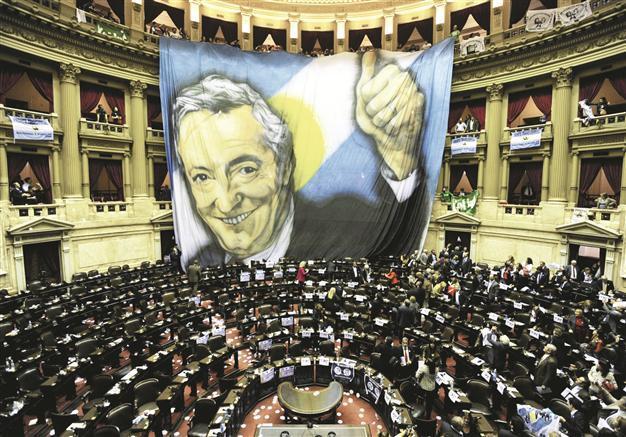Argentinean lawmakers OK nationalization of Repsol arm
BUENOS AIRES - Reuters

Supporters display a huge flag with the portrait of late President Nestor Kirchner, celebrating after the Congress approved the bill nationalizing oil companyYPF, on May 3, in Buenos Aires. The Argentine Congress on May 3 voted for the expropriation of the 51 percent of the bonds of YPF from Spanish company Repsol. AFP photo
Argentina’s Congress nationalized the country’s biggest oil company, YPF, by an overwhelming lower house vote on May 3 that underscored broad popular support for a measure that threatens to scare off foreign investment.
The Chamber of Deputies voted 207-32 in favor of expropriating YPF, clearing the way for President Cristina Fernandez to sign the bill into law. The Senate last week approved the measure by a similarly overwhelming margin.
Fernandez, who has tightened
state control of the economy, unveiled the plan to seize a majority stake in YPF from Spain’s Repsol six months after her landslide re-election.
The move drew a swift reprisal from Spain, which curtailed
Argentine biodiesel shipments. Wall Street warns that Argentina risks scaring off investment needed to bolster growth against fallout from Europe’s debt crisis and slower demand from key trade partner Brazil.
President blames YPFBusiness groups have long been put off by Fernandez’s policies, such as her government’s takeover of Argentina’s private pension system in 2008 and, more recently, import and foreign exchange controls that have hurt confidence.
Fernandez justifies the re-nationalization of YPF - which was privatized in the 1990s after decades as a state-owned company - on the grounds that it failed to boost oil and natural gas production needed to keep up with local demand.
Energy import bills have shot higher, putting Argentina’s prized trade surplus at risk.
Repsol denies under-investing, but the government’s message has struck a chord with Argentines, many of whom are suspicious of foreign companies and blame the free-market policies of the 1990s for setting the country up for its 2001/02 sovereign debt default and shock currency devaluation. “All oil companies that operate in Argentina, Repsol and the rest, have to work in the public interest, which in this case means energy self sufficiency for Argentina,” Agustin Rossi, leader of the official bloc in the lower house, shouted during a speech to the chamber just before the vote.
“Repsol invested little in Argentina,” Rossi said. “But it was YPF and Argentine oil that financed Repsol’s growth around the world.”
With the private sector worried more nationalizations may be on the way, attention now turns to how much Argentina will pay Repsol for control of YPF. Officials have said it will be a lot less than the $9.3 billion the Spanish company wants.
Relieved of much of its debt burden after the 2001/02 default and bolstered by high international soy prices, the grains-exporting powerhouse fared better than many countries in weathering fallout from the 2008 world financial crises.
The government budget predicts 2012 gross domestic product growth of 5.1 percent, down from 8.9 percent last year.
“The goal is for YPF to be aligned with the interests of the country,” Fernandez said in a speech on Thursday.
“When corporate interests are not aligned with national interests, when companies are concerned only with profits, that’s when economies fail, which is what happened globally in 2008 and what happened to Argentina in 2001,” she said.
